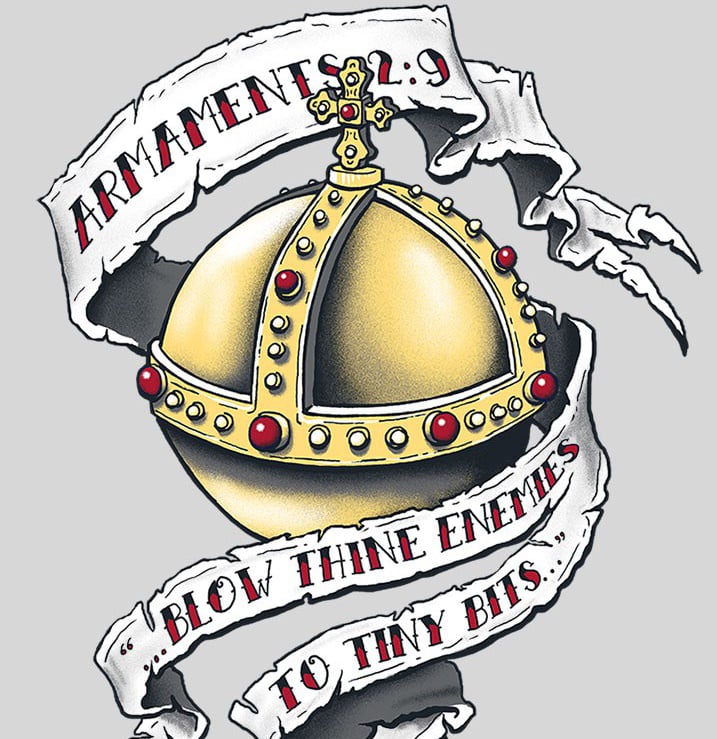Whoever designed that image should have to return the Fe they were paid.
Oh, the irony. :D
Teferric pun!
It would have been even better, if I’d said:
“An excellent source of irony.”
But alas, I’m not that witty on the spot. :-P
Whenever abbreviations don’t make sense, you can safely assume it’s Latin.
This is medicine in a nutshell too. And not just abbreviations, but acronyms… for words in a language that no one uses. I hate it.
I literally took Latin in college for the sole reason that Latin is used in super stupid ways, and my science communication degree would be worth less without that knowledge. Because Latin-base is fully half of the science terms you need to know.
And my college was super on board with my reasoning. Wish I’d also had the mental capacity for ancient Greek, because that’s literally the other half of naming schemes.
Ridiculous.
I’m super into modern scientists giving shit pop culture names. Because holy shit is it ever more memorable than some random Latin/greek bullshit.
Strange that ‘classics’ are taught mostly in the poshest schools. It’s rare for elites to want to preserve any power they have and make it inaccessible to oiks. /s
Well, what other language should be used? Latin is the language of science because there’s no way we’d ever agree on which alive language to use.
I didn’t say it was a bad system or that we need to change it: I said I hate it.
Fair enough haha
Um English? It’s the international language and language of research, though some may not like hearing that.
English is only the lingua franca for now, but that, as well as the English language, will inevitably change.
English might change drastically so much that we change words entirely (so old abbreviations don’t match new words), so let’s just go with the guaranteed dead language where abbreviations already don’t line up. Yeah I can’t agree with that logic.
The whole point of using a “dead” language is that languages change over time and scientists once had the foresight to attempt making their works more universal over both multiple languages and over time.
Let’s rename everything every century or so. It should make things easier.
Esperanto, the second language of the international laborer /hj
I unironically kinda wish that would take off. The concept of a super simple bridge language is great.
Can you give an eggsample?
Couple common ones… there are hundreds of these.
Acronym - Full Latin - English
PRN - pro re nata - as needed
NPO - nil per os - nothing my mouth
AC - ante cibum - before eating
OD - oculus dexter - right eye
OS - oculus sinister - left eye
Q8H - quaque octava hora - every 8 hours
QED
Etc
Hey I can finally ask, how much of medical terminology is Greek?
Latin is prelevant but many anatomy terms and conditions are Greek because a lot of the literature first describing conditions and early anatomy was Greek. Heme for blood, dermis for skin, cholecyst(bile bladder) for gallbladder, cyst for bladder ect. Anatomy itself is a word that comes from Greek.
Not really any that I’m aware of, but I’m a tech, so my insight is only surface level. Grain of salt.
What about tungsten or sodium?
Apparently tungsten is also known as Wolfram, so that’s the W. Sodium Na is from neo-latin.
It’s Na from Natrium (I have no idea why you even call it Sodium in English)
It’s called Sodium in English because an English chemist Sir Humphrey Davy discovered it & named it “Sodium” He was able to isolate it via separation of caustic soda (sodium hydroxide) and therefore named it after the caustic soda “soda-ium”. A few years later, a German chemist (Ludwig Wilhelm Gilbert) was able to isolate it and named it “Natronium” Just under a decade later, Jöns Jacob Berzelius coined the term “Natrium” as he felt the name “Natronium” was too lengthy to catch on.
As to exactly why the earlier term was not respected is likely due to nationalism. During the earlier 1800’s a lot of countries were desperately trying to take claim for various rapid advancements in chemistry, physics, mathematics, and medicine. Getting to have the name that “your guy” coined was largely bent around national pride.
Ty. So the question for its rightful name simply depends on whether you give it to the one who discovered it or the one who isolated it, interesting.
I’ll skip that discussion and just say Natrium sounds better
People will hate on this, but what other breakfast cereal contains dental X-rays in every crunch?
Just sucks they don’t provide the x-ray films in the package
Everyone knows that iron, like all abbreviated four-letter nouns gets abbreviated as the first three letters.
Iro
Jun
FucSee? Easy peasy
Iroh, Junk, Fuc… uhhhh… Fucu fish? Fucy, a name like “Lucy” but absolute garbtrash?
… Yeah okay that one’s just “Fuck.” But let’s talk about Iroh anyway! He’s way cool.
Don’t you mean “Eas peasy” :P
Easpeas
Iridium quality cereal? ConcernedApe is so good to us!
It’s hard to make though. You have to harvest Iridium quality Wheat and mine for Iridium bars and then build the Advanced Cereal Irradiator on your farm to craft it.
It’s hard to do until year 2.
That’s some expensive cereal…
Probably cheap compared to that Kashi stuff.
Takes a distant third to magic spoon
Yeah, my good buddy is from Genovia, where they use a regional version of the periodic table with more human-friendly names. They use Ca for calcium, Ir for iron, Hy for hydrogen, and Ox for oxygen. This change was their answer to the metric system—a way to make science more accessible to everyone ostensibly I believe.
Back in the 1960s, Gennovia was looking to bolster its local industry and economy. The government decided that simplifying scientific terms would help more people get into science and technology fields. It seems to be working because their literacy rates in science are through the roof? Somehow. They even have Ni for nickel and Si for silver, making it so much easier to remember what’s what. I didn’t know it was prevalent enough that it made its way onto package branding tho. Interesting stuff.
a way to make science more accessible to everyone ostensibly I believe.
everyone that speaks English…
well, we all know everyone who does science speaks english 🤷♀️
edit: /s
10/10 chain jerking
i’m jerking their chains🤣
Well I didn’t expect to see a Meg Cabot reference on Lemmy. (She’s actually a family friend believe it or not.)
Can confirm Genovia doesn’t a fuck about IUPAC and its naming conventions.
Do we know the root of the history behind this? Were there any genuine reasons or minds behind it or was it reactionaryism, plain and simple?
The Genovians are famous for their elemental wizardry
deleted by creator
Bröther
Love me some cereal fortified with Iridium
man = male, iron = Fe > __________
Feman
And the Masters of the Universe!!
I HAVE THE POWER!!!
I’ve swapped my genderrrrrr!!!
Male man

In Old English, the two people married were known as ‘husband’ and ‘huswif,’ so maybe we need to go with heman and sheman from now on.
Your number one source of Iridium and Californium! Over 10,000,000 calories in each bite!
Quickly, you only have .0001 seconds to enjoy your Californium!
Not to be too pedantic, but Californium is Cf
It’s what? I can’t hear you
Sorry you’ll have to speak up I’m wearing a towel
If they put the correct symbol there it would read café
Also a good source of California
Fe
Of course that’s iron. What, is that a Latin root or something?
Yup, ferrum is the Latin word.
Good thing I speak French, it won’t ever get me confused. In French, iron is called “fer”. Also, copper is “cuivre”, which also matches its periodic table symbol of Cu. Same can be said for lead: “plomb”.
Unfortunately, there’s quite a few that also don’t match the symbol, some aren’t even in English. I always hated how nitrogen is called “azote” in French.
Azides are nitrogen compounds though, so still usefully to know.
I’m glad I know this now.
If they put “Fe” on it, too many people would boycott it for gendering the cereal.
It’s latin for Female Iron. Remember everything was gendered in the world of Romantic Romans




















